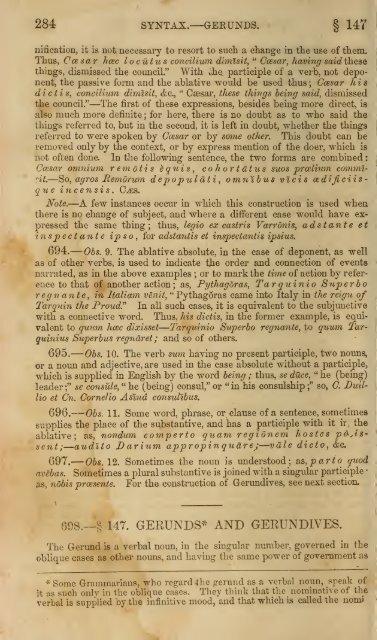The principles of Latin grammar; comprising the ... - Essan.org
The principles of Latin grammar; comprising the ... - Essan.org
The principles of Latin grammar; comprising the ... - Essan.org
- No tags were found...
Create successful ePaper yourself
Turn your PDF publications into a flip-book with our unique Google optimized e-Paper software.
—:284 SYNTAX.—GERUNDS. § 147nification, it is not necessary to resort to such a change in <strong>the</strong> use <strong>of</strong> <strong>the</strong>m.Thus, Ccesar hcec I o cuius concilium d'milsit, " Caesar, having said <strong>the</strong>sethings, dismissed <strong>the</strong> council." With die participle <strong>of</strong> a verb, not deponent,<strong>the</strong> passive form and <strong>the</strong> ablative would be used thus ; Ccesar hisdicti s, concilium dimisit, (fee, " Caesar, <strong>the</strong>se things being said, dismissed<strong>the</strong> council."—<strong>The</strong> first <strong>of</strong> <strong>the</strong>se expressions, besides being more direct, isalso much more definite ; for here, <strong>the</strong>re is no doubt as to who said <strong>the</strong>things referred to, but in <strong>the</strong> second, it is left in doubt, whe<strong>the</strong>r <strong>the</strong> thingsreferred to were spoken by Ccesar or by some o<strong>the</strong>r. This doubt can beremoved only by <strong>the</strong> context, or by express mention <strong>of</strong> <strong>the</strong> doer, which isnot <strong>of</strong>ten done. In <strong>the</strong> following sentence, <strong>the</strong> two forms are combinedCaesar omnium r emoti s equis , cohort at us suos proelium comrnlvit.—So,agros Remorum depopuldti , omnibus vie is ozdificiisqueincensis. Cjss.Note.—A few instances occur in which this construction is used when<strong>the</strong>re is no change <strong>of</strong> subject, and where a different case would have expressed<strong>the</strong> same thing ;thus, legio ex castris Varronis, adstante etinspect ante ipso , for adstantis et inspectantis ipsius.694.— Obs. 9. <strong>The</strong> ablative absolute, in <strong>the</strong> case <strong>of</strong> deponent, as wellas <strong>of</strong> o<strong>the</strong>r verbs, is used to indicate <strong>the</strong> order and connection <strong>of</strong> eventsnarrated, as in <strong>the</strong> above examples ;or to mark <strong>the</strong> time <strong>of</strong> action by referenceto that <strong>of</strong> ano<strong>the</strong>r action; as, Pythagoras, Tar quinio Super bor eg n ante, in Italiam venit, "Pythagoras came into Italy in <strong>the</strong> reign <strong>of</strong>Tarquin <strong>the</strong> Proud." In all such cases, it is equivalent to <strong>the</strong> subjunctivewith a connective word. Thus, his dictis, in <strong>the</strong> former example, is equivalentto quum hcec dixisset— Tarquinio Superbo regnante, to quum TarquiniusSuperbus regndret; and so <strong>of</strong> o<strong>the</strong>rs.695. Obs. 10. <strong>The</strong> verb sum having no present participle, two nouns,or a noun and adjective, are used in <strong>the</strong> case absolute without a participle,which is supplied in English by <strong>the</strong> word being ; thus, se duce, " he (being)leader ;" se consule, " he (being) consul," or " in his consulship ;" so, C. Duillioet Cn. Cornelio Asind consulibus.696. Obs. 11. Some word, phrase, or clause <strong>of</strong> a sentence, sometimessupplies <strong>the</strong> place <strong>of</strong> <strong>the</strong> substantive, and has a participle with it ir, <strong>the</strong>ablative; as, nondum comperto qu am region em hostes pt^Jsse?it;—audlto Barium appropinqudre ;—vale dicto,&a.697.— Obs. 12. Sometimes <strong>the</strong> noun is understood; as, par to quodavebas. Sometimes a plural substantive is joined with a singular participle •as, nobis prcesente. For <strong>the</strong> construction <strong>of</strong> Gerundives, see next section.698.—§ 147. GERUNDS* AND GERUNDIVES.<strong>The</strong> Gerund is a verbal noun, in <strong>the</strong> singular number, governed in <strong>the</strong>oblique cases as o<strong>the</strong>r nouns, and having <strong>the</strong> same power <strong>of</strong> government as*Some Grammarians, who regard <strong>the</strong> gerund as a verbal noun, speak <strong>of</strong>it as such only in <strong>the</strong> oblique cases. <strong>The</strong>y think that <strong>the</strong> nominative <strong>of</strong> <strong>the</strong>verbal is supplied by <strong>the</strong> infinitive mood, and that which is called <strong>the</strong> nomi
















